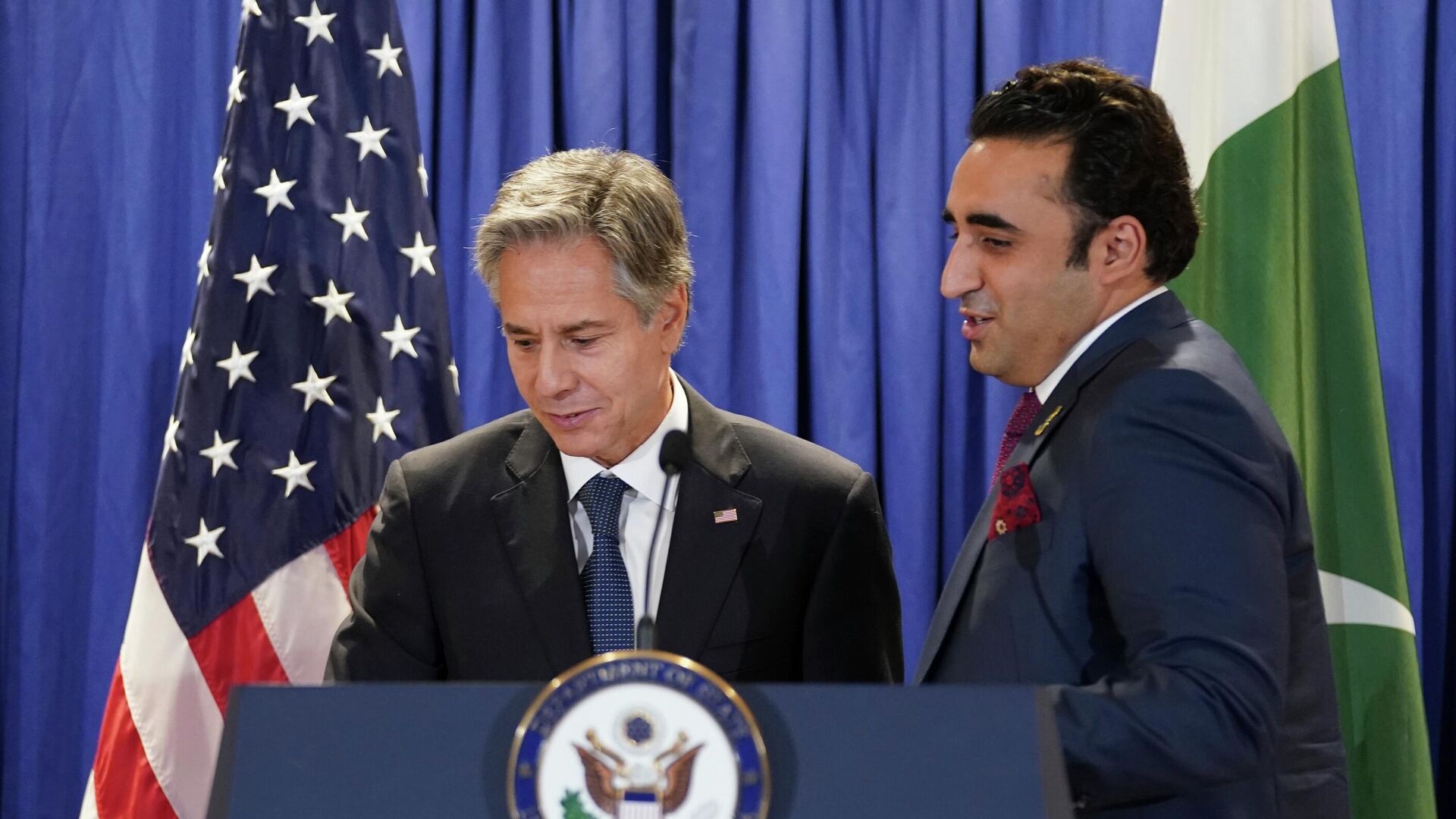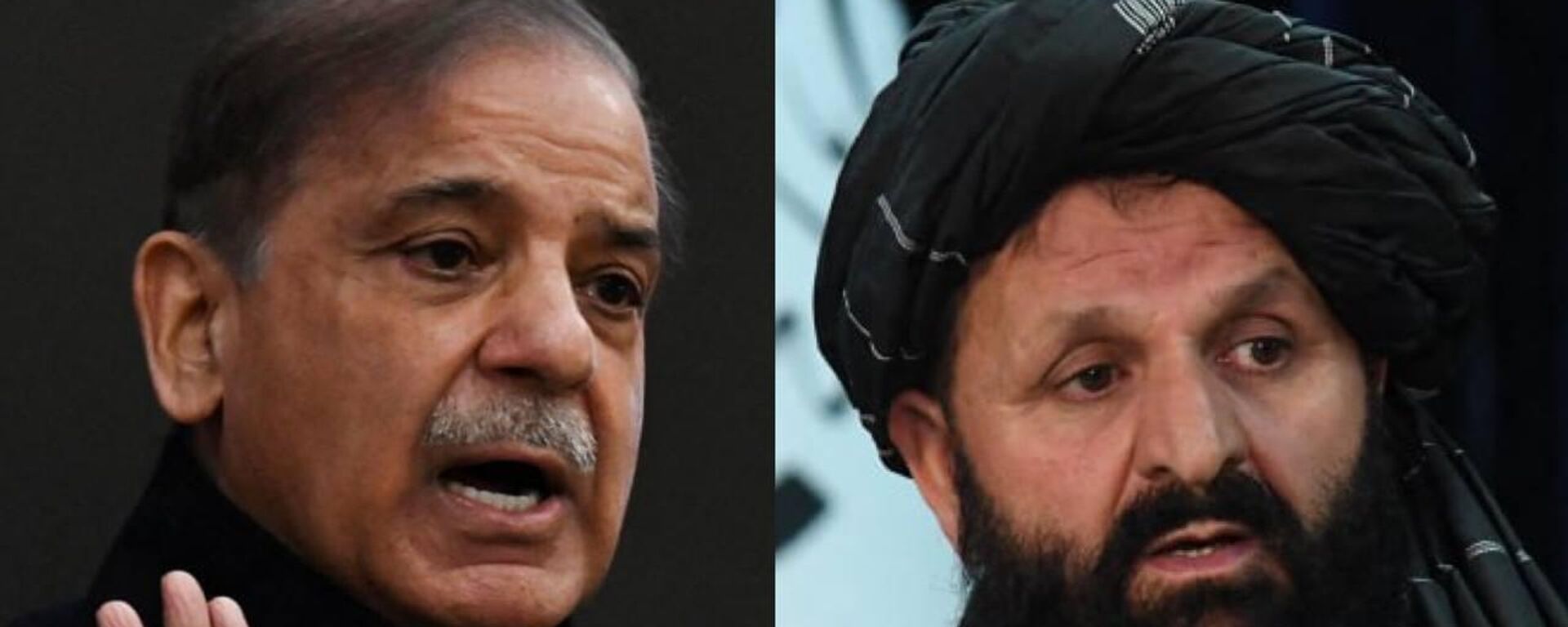https://sputniknews.in/20240726/strange-state-of-us-pakistan-relations-as-presidential-election-looms-7915248.html
Strange State of US-Pakistan Relations as Presidential Election Looms
Strange State of US-Pakistan Relations as Presidential Election Looms
Sputnik India
As the US elections are right around the corner, changes in the White House may afflict Pakistan's relationship with its preeminent geopolitical partner.
2024-07-26T20:40+0530
2024-07-26T20:40+0530
2024-07-26T20:40+0530
joe biden
donald trump
barack obama
india
pakistan
us
multilateral diplomacy
political controversy
foreign interference
south asia
https://cdn1.img.sputniknews.in/img/07e7/0b/15/5509624_0:0:2823:1589_1920x0_80_0_0_2edbc338a109296036a4531d8ed38312.jpg
US President Joe Biden has stepped down from re-election and has endorsed his Vice President Kamala Harris as Democrat candidate for the presidency to go up against Republican nominee Donald Trump.The recent rule of Democrats in the US has caused much friction between Islamabad and Washington. In June, Pakistan accused the United States of attempting to interfere in its internal affairs just after the US House of Representatives passed a resolution raising questions about the credibility of Pakistan's general election in February.Pakistan's top leadership criticized the resolution and suggested that the US needed to do more to ensure transparency in its own upcoming elections later this year and not meddle with Pakistan's internal matters.Pakistani Defence Minister, Khwaja Asif, went as far as questioning the US track record of involvement in removing foreign governments in the past, while referencing its support for Israel during its ongoing war on Gaza.This incident was one of many political tussles that took place between Pakistan and the US during Joe Biden's four-year term.A Humiliating RelationshipDr Shahid Rashid, former Unit Head of Engro Corporation and political observer, told Sputnik India that Pakistan-US relations have been unique and it is "incorrect to call them relations at all" because the alliances between nations are based on mutual trust, respect and interest."But for the US Pakistan was always just a proxy, because after Pakistan's independence, India and the Soviet Union became close and the US needed to counter that closeness by finding a partner in the South Asian region, so Pakistan was used by the US to spy on the Soviet Union’s growing influence in the region,” he notedHe added that for decades there were US military bases all over Pakistan from which secret missions took place and spy planes flew over the Soviet Union territories — spying and reporting back to Washington.Turning to Democratic party rule in Washington and its effect on Pakistan, the commentator said that the US Democrats push for democracy in South Asia, but historically they had always preferred the “rule of dictators and army generals in Pakistan, such as Zia ul Haq and Parvez Musharaf, rather than democratically elected leaders, because it was more difficult for the US to accomplish their evil political tactics through democratic governments.""For decades Pakistani dictators stayed in power as they had the US support behind them," Rashid said.According to the pundit, ties between India and the US have improved recently because New Delhi is seen as an important strategic partner in Washington, to counterbalance the rising military and economic might of China. In light of this geopolitical shift Pakistan has currently taken a backseat in the US political agenda.Democrats or Republicans for Pakistan?Under Democratic Party administrations, particularly during Barack Obama's presidency, the US-Pakistan relationship experienced significant strain. The operation that led to the killing of Osama bin Laden in Abbottabad in 2011 without prior notification to Pakistani authorities highlighted the lack of trust between the two countries.Despite this, the US continued to provide substantial military and economic aid to Pakistan, emphasizing the necessity of cooperation in counter-terrorism efforts. However, as soon as the war in Afghanistan came to an end, the US lost interest in Pakistan.US Contradictory Policies in South AsiaAccording to the political observer, the current dynamics between the US, India, and Pakistan form a critical part of the geopolitical puzzle in South Asia. US relations with India have improved significantly in recent years, driven by concerns over China’s rise.He added that US strategic engagements in South Asia often appear contradictory, because when the US seeks to counterbalance India’s close ties with Russia it tends to bolster its relationship with Pakistan."Currently India is a prime interest for the US because Washington wants to prevent China’s influence in the region," Masood said. "Ties with India are more important for the US foreign policy, irrespective of who comes to power in the White House. This shift oftentimes comes at the expense of Pakistan, leading to a cyclical pattern of engagement and estrangement."Nevertheless, both the analysts agreed that Pakistan's role in counter-terrorism cannot be overstated and despite periodic strains, the US requires Pakistan’s cooperation to stabilize Afghanistan and counter extremist groups in the region.This necessity often compels the US to maintain a working relationship with Pakistan, irrespective of the ruling party in Washington.
https://sputniknews.in/20240722/from-allies-to-adversaries-the-evolving-dynamics-of-ttp-taliban-and-pakistan-7881374.html
india
pakistan
us
south asia
Sputnik India
feedback.hindi@sputniknews.com
+74956456601
MIA „Rossiya Segodnya“
2024
Aneela Rashid
https://cdn1.img.sputniknews.in/img/07e6/0c/0d/74548_0:0:485:484_100x100_80_0_0_821526e967ae85d041e2d30ee34fa1de.jpg
Aneela Rashid
https://cdn1.img.sputniknews.in/img/07e6/0c/0d/74548_0:0:485:484_100x100_80_0_0_821526e967ae85d041e2d30ee34fa1de.jpg
News
en_IN
Sputnik India
feedback.hindi@sputniknews.com
+74956456601
MIA „Rossiya Segodnya“
Sputnik India
feedback.hindi@sputniknews.com
+74956456601
MIA „Rossiya Segodnya“
Aneela Rashid
https://cdn1.img.sputniknews.in/img/07e6/0c/0d/74548_0:0:485:484_100x100_80_0_0_821526e967ae85d041e2d30ee34fa1de.jpg
us-pakistan, india-us, us
us-pakistan, india-us, us
Strange State of US-Pakistan Relations as Presidential Election Looms
The complex relationship between the US and Pakistan, particularly under Democratic Party administrations, has long been a subject of scrutiny. With the US elections around the corner, changes in the White House may affect Pakistan's relationship with its preeminent geopolitical partner.
US President Joe Biden has stepped down from re-election and has endorsed his Vice President Kamala Harris as Democrat candidate for the presidency to go up against Republican nominee Donald Trump.
The recent rule of Democrats in the US has caused much friction between Islamabad and Washington. In June, Pakistan accused the United States of attempting to interfere in its internal affairs just after the US House of Representatives passed a resolution raising questions about the credibility of Pakistan's
general election in February.
Pakistan's top leadership criticized the resolution and suggested that the US needed to do more to ensure transparency in its own upcoming elections later this year and not meddle with Pakistan's internal matters.
Pakistani Defence Minister, Khwaja Asif, went as far as questioning the US track record of involvement in
removing foreign governments in the past, while referencing its support for Israel during its ongoing war on Gaza.
This incident was one of many political tussles that took place between Pakistan and the US during Joe Biden's four-year term.
A Humiliating Relationship
Dr Shahid Rashid, former Unit Head of Engro Corporation and political observer, told Sputnik India that Pakistan-US relations have been unique and it is "incorrect to call them relations at all" because the alliances between nations are based on mutual trust, respect and interest.
"Pakistan and the US never had relations based on mutual trust or respect," Rashid explained. "Interest was one-sided mostly, as Pakistan had always thought of the US as its friend and portrayed it so to the world."
"But for the US Pakistan was always just a proxy, because after Pakistan's independence, India and the Soviet Union became close and the US needed to counter that closeness by finding a partner in the South Asian region, so Pakistan was used by the US to spy on the Soviet Union’s growing influence in the region,” he noted
He added that for decades there were US military bases all over Pakistan from which secret missions took place and spy planes flew over the Soviet Union territories — spying and reporting back to Washington.
“The US has used Pakistan repeatedly in the 80s also, during the Soviet-Afghan war, but only for its strategic interests and I think such a relationship is a humiliating one," Rashid stated.
Turning to Democratic party rule in Washington and its effect on Pakistan, the commentator said that the US Democrats push for democracy in South Asia, but historically they had always preferred the “rule of dictators and army generals in Pakistan, such as Zia ul Haq and Parvez Musharaf, rather than democratically elected leaders, because it was more difficult for the US to accomplish their evil political tactics through democratic governments."
"For decades Pakistani dictators stayed in power as they had the US support behind them," Rashid said.
According to the pundit, ties between
India and the US have improved recently because
New Delhi is seen as an important strategic partner in Washington, to counterbalance the rising military and economic might of China. In light of this geopolitical shift Pakistan has currently taken a backseat in the US political agenda.
Democrats or Republicans for Pakistan?
Under Democratic Party administrations, particularly during Barack Obama's presidency, the US-Pakistan relationship experienced significant strain. The operation that led to the killing of Osama bin Laden in Abbottabad in 2011 without prior notification to Pakistani authorities highlighted the lack of trust between the two countries.
Despite this, the US continued to provide substantial military and economic aid to Pakistan, emphasizing the necessity of cooperation in counter-terrorism efforts. However, as soon as the war in Afghanistan came to an end, the US lost interest in Pakistan.
"I don't think it matters much whether a Democrat or a Republican comes to power in the US because it is the US establishment, army and security agencies that deal with foreign policy, just like they do for all other countries," Rashid said. "It makes little difference for Pakistan who sits in the oval office.”
US Contradictory Policies in South Asia
According to the political observer, the current dynamics between the US, India, and Pakistan form a critical part of the geopolitical puzzle in South Asia. US relations with India have improved significantly in recent years, driven by concerns over China’s rise.
“When the US engages more closely with India, especially in sensitive regions like Kashmir, it sends a strong signal to Pakistan," Rashid said. "These actions are sometimes interpreted as punitive measures against Islamabad or as efforts to leverage Pakistan’s position on other strategic issues.”
He added that US strategic engagements in South Asia often appear contradictory, because when the US seeks to counterbalance India’s
close ties with Russia it tends to bolster its relationship with Pakistan.
Fahad Masood, international security analyst and a former squadron leader in Pakistan Air Force said that “Pakistan-US relations are sour and Pakistan's usability for the US has taken a back seat for now."
"Currently India is a prime interest for the US because Washington wants to prevent China’s influence in the region," Masood said. "Ties with India are more important for the US foreign policy, irrespective of who comes to power in the White House. This shift oftentimes comes at the expense of Pakistan, leading to a cyclical pattern of engagement and estrangement."
Nevertheless, both the analysts agreed that Pakistan's role in counter-terrorism cannot be overstated and despite periodic strains, the US requires Pakistan’s cooperation to stabilize Afghanistan and counter extremist groups in the region.
This necessity often compels the US to maintain a working relationship with Pakistan, irrespective of the ruling party in Washington.



